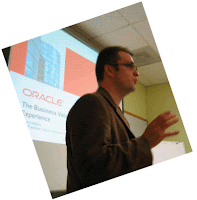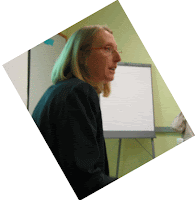
"Thanks for your presentation. You're the only presenter to have spoken about the dilemmas we face. Most of the other speakers have been providing their 3- or 4-part prescriptions for success almost as if we will confront no challenges to following them!"Describing aspects of the everyday reality that managers of user experience often live in was what I had been asked to do as part of my presentation at Mx 2008 last week in San Francisco, which is where I received the above feedback. And I described the same in a very different context
 early in the month as part of a presentation at HCIEd08 in Rome.
early in the month as part of a presentation at HCIEd08 in Rome.My focus in both cases was (a subset of) the difficulties, the challenges, the dilemmas, ... which such personnel need to address to be able to play a strategic role in the companies in which they work.
What claims did I make about that everyday reality?
 A slide summarizing the claims appears nearby. (You can click on it to enlarge it.)
A slide summarizing the claims appears nearby. (You can click on it to enlarge it.)As an example, here is something akin to what I said about claim #1:
"'Experience management and non-management personnel are often overwhelmed with work.' In a sense, this is good, as it reveals that the demand for services is now high, which has not always been the case. But this is actually not so good, because it often hurts the quality of the work they do, and it often means that people are working on things that are not that important, that are not that impactful. Hence, the solution isn't necessarily one of adding more personnel or hiring contractors; that often isn't even an option. But there are solutions, solutions which will actually enable one to secure the budget to add more personnel more quickly. But because the experience personnel are so overwhelmed, they often don't have the time or mental space to step back, assess the situation, and figure out what those solutions are. So they are often stuck, and they are often stuck doing work that is not important and often a waste of their time and effort and a waste of their company's time and resources."In Rome, I followed my description of the challenges with an assortment of ideas about how the challenges might be met via new or modified or extended "educational experiences" for management personnel, and I encouraged attendees -- note that HCIEd08 was a conference for educators -- to generate additional ideas.
In San Francisco, I followed the description with examples of the ways successful experience
 managers and executives have framed such challenges in order to address them. For example, I described how Jeremy Ashley, VP Applications Experience at Oracle, argues the importance of seeing design not as a service, but as a driver and differentiator of the process. I told of how Lisa Anderson, Director User Experience at Autodesk, similarly argues the importance of prioritizing and focusing -- of not taking on all requests so to not be treated like a service organization --
managers and executives have framed such challenges in order to address them. For example, I described how Jeremy Ashley, VP Applications Experience at Oracle, argues the importance of seeing design not as a service, but as a driver and differentiator of the process. I told of how Lisa Anderson, Director User Experience at Autodesk, similarly argues the importance of prioritizing and focusing -- of not taking on all requests so to not be treated like a service organization --  of how it is better to change one feature by 70% than to change several by 10%. I told of how Klaus Kaasgaard, VP Customer Insights at Yahoo!, argues that too much research being done is tactically focused because researchers have not been good at saying "no" -- that it had been the case at Yahoo! that success was measured by the number of projects done and how few they said "no" to: "We would then get a bonus
of how it is better to change one feature by 70% than to change several by 10%. I told of how Klaus Kaasgaard, VP Customer Insights at Yahoo!, argues that too much research being done is tactically focused because researchers have not been good at saying "no" -- that it had been the case at Yahoo! that success was measured by the number of projects done and how few they said "no" to: "We would then get a bonus  for executing on all requests, though doing so had limited our impact on the business." And I reminded attendees that in a presentation earlier that day at the Mx conference, Cordell Ratzlaff, Director User-Centered Design at Cisco, had also argued the importance of saying "no."
for executing on all requests, though doing so had limited our impact on the business." And I reminded attendees that in a presentation earlier that day at the Mx conference, Cordell Ratzlaff, Director User-Centered Design at Cisco, had also argued the importance of saying "no."Then I asked: "Do you say 'no' where you work? Dare you? Would you remain in your job if you did? Or would you find that people would be happy if you were to start saying 'no'? What might need to be true before you consider using that strategy?" (Note that not all successful experience managers and executives have taken such an approach.)
In a workshop, I would have asked attendees to answer such questions and to discuss the pros and cons of that particular framing and approach as well as of many others to help them figure out which framing and approach or what combination of framings and approaches or what variation of a framing and approach is something they should consider attempting in their workplace.
I'll be sharing more framings and approaches in upcoming blog entries.
---
Jeremy, Lisa, and Klaus were among the wonderful user experience managers and executives who appeared as guest speakers during my recently concluded, "User Experience Managers and Executives Speak" course.
